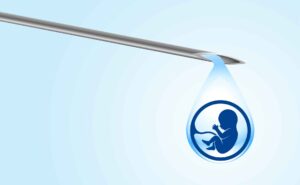Did you know that 1 in 6 people grapple with fertility issues? As this number continues to rise, the search for underlying causes continues to expand. Lifestyle factors, stress, and daily pressures have long been cited as contributing factors to infertility. However, the list of potential culprits has expanded, with plastic. Clinical trials now suggest that plastic could indeed play a role in infertility. How exactly does this happen? Let’s know more about it in the article below.
How Plastic Quietly Invades Our Body?
Despite our collective efforts to avoid plastic, it still manages to sneak into our bodies through everyday activities. Drinking water from plastic bottles, eating food stored in plastic containers, or even consuming fruits and vegetables wrapped in plastic can introduce harmful toxins into our bodies.
The bigger issue is microplastics. These tiny particles, resulting from the decomposition of larger plastic items, infiltrate the air, water, and soil, eventually making their way into the food chain. Seafood, grains, and even meat become carriers of this overlooked invader. Unfortunately, our personal care products are also loaded with microbeads and synthetic fibers contributing to this issue.
Is Plastic Sabotaging Your Fertility?
So, could plastic really be the reason behind your struggles with fertility? Scientific evidence points to a strong possibility. Chemicals present in plastic, like Bisphenol A (BPA) and phthalates, are recognized for their ability to disrupt the endocrine system and affect the hypothalamus-pituitary-adrenal (HPA) axis in the brain. This axis plays a crucial role in hormone production for both men and women.
Heightened plastic consumption can disturb these delicate regions, resulting in adverse impacts on fertility. Moreover, it may also contribute to increased cancer rates, not just affecting reproductive health.
Impact on Women’s Fertility:
- Hormonal Disruption: Plastic contains endocrine-disrupting chemicals that mimic hormones, causing imbalances.
- Reduced Egg Quality: Exposure to plastics may contribute to lower egg quality, affecting overall fertility.
- Menstrual Irregularities: Disruptions in hormone production can lead to irregular menstrual cycles, affecting fertility.
- Increased Risk of Endometriosis: Plastic impacting hormone levels may contribute to the development of endometriosis, a condition affecting fertility.
Impact on Men’s Fertility:
- Reduced Sperm Count: Plastic chemical compounds have been linked to decreased sperm count in men.
- Impaired Sperm Quality: Exposure to plastic may result in sperm with reduced motility and abnormal morphology.
- Erectile Dysfunction: Certain plastic components may contribute to erectile dysfunction, impacting male fertility.
- Disruption of Testosterone Production: Plastic can interfere with testosterone synthesis, affecting reproductive health in men.
How To Defend Ourselves Against Plastic Threats?
Here are a few steps you can take to minimize plastic usage in your lifestyle:
- Avoid Single-use Plastic: Refrain from using disposable plastic items such as water bottles, straws, and utensils. Opt for reusable alternatives to minimize your environmental footprint.
- Opt for alternatives: Opt for glass, copper, iron, stainless steel, or clay to drastically reduce exposure to plastic and potentially harmful substances.
- Choose BPA-Free Plastic: While it’s challenging to eliminate plastic when using plastic items, prioritize those labeled as BPA-free. Bisphenol A (BPA) is a known endocrine disruptor found in certain plastics, and opting for BPA-free alternatives helps reduce exposure to harmful substances.
- Eco-Friendly Shopping Bags: Invest in reusable, eco-friendly shopping bags made from materials like cloth or jute. This simple switch reduces reliance on single-use plastic bags and contributes to environmental conservation.
- Compostable and Biodegradable Products: Opt for products made from bamboo, such as toothbrushes, utensils, and plates. These eco-friendly alternatives break down naturally, posing less harm to the environment.
- Educate Others: Share information about the impacts of plastic pollution with friends, family, and colleagues. By raising awareness, you contribute to a collective understanding of the importance of reducing plastic use.
The impact of plastic on our health extends beyond infertility, triggering conditions like PCOS and pregnancy complications. It’s critical to pay close attention to our exposure to plastics and take proactive measures to minimize it. If you’re already facing fertility issues or related conditions like PCOS, seek expert assistance for infertility treatment for PCOS at The Boon IVF. The Boon IVF offers comprehensive infertility treatments in Hyderabad, led by the best fertility doctors in Hyderabad who are equipped to address diverse reproductive health concerns.
Begin your journey towards improved fertility by scheduling a consultation with The Boon IVF today.


